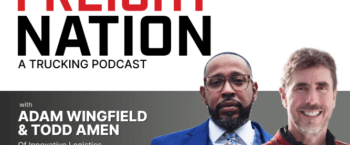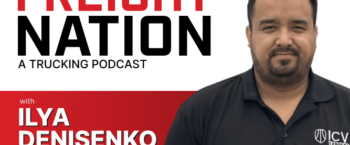Choosing the Best Factoring Company for Your Trucking Business

Get paid faster with Factoring.
Say goodbye to cash flow worries.
One of the most significant issues for any small business is cash flow. Most clients you haul for pay your outstanding invoices 30, 60, or even 90 days later. In the meantime, you still have expenses to continue to run your company.
Some daily and monthly expenses like fuel, maintenance, and insurance can’t be put off that long. This is why many businesses, including trucking, use a factoring company.
What exactly is factoring? And what’s the best way to choose a factoring company for your trucking business? Here are some tips and tricks you should know.
What is a factoring company?
A factoring company essentially buys your unpaid invoices. Factoring is sometimes also called accounts receivable financing. Top factoring companies pay you the invoice amount quickly, usually within 24 hours once the invoice has been verified. They then collect that same unpaid invoice balance from your broker customer when they payout.
You can tailor factoring based on your needs. Some business owners factor all of their invoices regardless of how fast brokers pay. Others only factor some, usually for slow-paying customers or on an as-needed basis.
Factoring puts cash in your pocket so you can use it for payroll, fuel, and other short-term expenses. It also relieves some of the administrative burdens of chasing down payments. For this reason alone, many smaller businesses factor all of their invoices.
Recourse vs. non-recourse factoring
What happens if your customer pays the factoring company very late, or not at all? The answer depends on the type of factoring you choose.
Factoring companies may offer one of two types of factoring: recourse and non-recourse.
Recourse Factoring
In recourse factoring, if a customer doesn’t pay an invoice, you have to “buy it back” from the factoring company and seek payment on your own. In other words, you are ultimately responsible for any non-payment.
Non-Recourse Factoring
With non-recourse factoring, the factoring company assumes responsibility for the debt and collecting it. But be careful; examine the fine print because there are some restrictions.
- Some factoring companies only offer non-recourse protection if your customer goes bankrupt or becomes insolvent.
- Invoices from high-risk companies with low or no credit scores cannot be factored.
- Some companies may charge higher fees associated with non-recourse factoring.
Non-recourse factoring can be beneficial if you understand the restrictions. Some factoring companies have their own credit teams and can protect you from working with bad-credit clients. Either way, a good factoring company should make diligent efforts to collect all invoices you choose to factor.
What does a factoring company do?
Factoring companies buy your invoices and pay you right away, minus a fee — usually a percentage of the invoice. Then they collect the outstanding invoice amount when your client pays. It can be easier than getting a line of credit or loan from a bank in some ways.
Factoring with a broker can be beneficial for small businesses because:
- Your credit score matters less than the credit score of your clients and customers.
- You get paid right away.
- How much you “finance” grows as you factor more invoices from your customers.
- The more invoices you factor, the lower your rate may be.
- Some factoring companies offer other back-office accounting services, such as accounts payable and human resource management for a small fee.
A factoring company can become part of your business accounting team, managing accounts receivable for you. This takes invoicing, managing billing, and collections off your plate and lets you spend more time booking paying jobs.
A good factoring company will offer options. They won’t have any minimum number or dollar amount of invoices you must factor. You can choose which ones to factor, they charge flat rates, and there are no cancellation charges or long-term contracts.

Which industries use factoring companies?
Almost any industry that invoices customers can benefit from factoring. Here are a few examples:
- Construction companies and construction suppliers
- Government agencies and contractors
- Healthcare providers and medical equipment suppliers
- Manufacturing
- Oil and gas
- Service providers (salons, pet grooming, repair shops)
- Technology and software
- Telecommunications
- All aspects of the transportation and logistics industry
Almost any industry with ongoing short-term expenses impacted by cash flow issues or that needs accounts receivable support can benefit from invoice factoring.
How much do factoring companies charge?
Factoring companies make money by charging a factoring fee, which is usually a flat percentage of each invoice you factor. Generally, fees range from 1.15% to 3.5% per month. This can vary based on the type of factoring you choose and the number of invoices (and dollar amounts) of each invoice you factor.
It’s essential to pay attention to the fee structure when you talk to a factoring company. Some include additional fees for some services, including:
- The amount or number of invoices you are factoring
- Aging (length of time invoices are outstanding)
- The credit quality of customers
- Money transfers
- Operations costs
- Collections costs
- Advances
Some trucking factoring companies require minimum monthly volumes. If you fail to meet these volumes, you might be charged with additional fees. Also, if you terminate your factoring agreement before the end of the contract, you may be charged a termination fee.
The primary thing to keep in mind is that the factoring company you work with should be transparent and upfront about any of these fees. If you see unexpected hidden fees taken out of your invoices, that’s a red flag to investigate. Those fees come directly out of your profits, so you want them to be as predictable and reasonable as possible.
How does factoring help trucking companies?
Most businesses fail because of a lack of working capital or cash flow problems. While factoring an invoice does cost you a percentage in fees, it’s often worth the expense. The time you would spend preparing bills, collecting payment on invoices, and managing paperwork can be focused on hauling more loads and making more money.
The time you save by letting someone else chase down your invoices and the paperwork that goes with it can be invaluable. The more you grow, the more billing work you will have. The ability to outsource that to someone else keeps your cash flow healthy.
Benefits of trucking factoring
No matter how large or small your trucking business is, invoice factoring can contribute to your success in many ways.
- Faster access to payments. The factoring process gives you rapid access to cash. Freight factoring lets you cover short-term operating costs without having to wait or worry about collections.
- Overcomes credit challenges. When evaluating invoices, a factoring company will look at the creditworthiness of the broker or shipper rather than your credit rating. So, if you have any credit blemishes on your trucking business record, you can still get access to cash quickly.
- Direct payments to fuel cards. The best factoring companies will pay invoices directly to fuel cards and offer discounts to those in the trucking industry.
How do factoring companies qualify freight carriers?
A freight factoring company will typically qualify freight carriers based on risk and volume and other factors.
Monthly invoice volume
The more business you do with them and the greater the invoice value, the fewer fees you will be charged as a percentage.
Customer diversity
If you handle freight for a single company or a small group of brokers or shippers, a freight factoring company will examine the risk. A diverse customer base lessens that risk.
Customer credit risk
Customer credit risk: Companies will evaluate the creditworthiness of the company you have invoices for, including how long they typically take to pay their bills.
Percentage of advance
Trucking industry factoring companies can lower their risk by advancing only a portion of your invoices. For example, paying an advance on 85% of the invoice rather than the total can help you get a better rate.
How do you choose the best factoring company?
There are many factoring companies out there, and choosing can be a challenge. The key is to choose the best fit for your unique circumstances. Just as you would interview a new employee, ask these questions of your factoring company.

The factoring process
- Which invoices can I factor and which invoices are ineligible? This may depend on your customers and their credit scores, so have a list ready.
- Can I factor some invoices and not others? Usually, you can, but make sure. Some companies require you to factor every invoice.
- How much can I borrow at any one time?
Payments and fees
- How quickly will I get paid when I submit an invoice? The answer should be within 24 hours.
- What are your factoring fees? Preferably, it’s a flat fee. Good factoring companies often offer a discount or low rates if you factor more invoices.
- Are there any other fees I should be aware of? (Money transfers, collateral, etc.) Make sure you are clear on these fees and they fit within your budget before you sign any agreement.
- What happens if a customer does not pay an invoice within a reasonable time?
- What is the time limit for customers to pay invoices?
- Do you charge an “aligning fee” if customers take longer to pay?
- Is there a factoring fee for transactions, such as sending money to my account? Are there minimum volume fees?
Contracts and terms
- Is there a long-term contract? If so, how long is it, and what are the terms? Are there termination fees?
- Do you require a reserve account?
- Do you offer recourse or non-recourse financing? Recourse loans offer lower fees, but you will have to refund payments if the customer does not pay. With a non-recourse loan, the factoring company assumes all of the risks if the customer doesn’t pay and will charge higher freight factoring fees.
Experience
- How long have you been in business?
- Do you have experience working in the freight industry?
- Do you have experience with freight companies my size?
Get paid when you need the money.
Truckstop offers factoring services that are simple and easy to use. We offer flat fees, non-recourse factoring, full-service billing, flexible cancellation, and no minimum volume requirements. You can even get paid within 24 hours.
In short, you get paid on invoices when you need the money the most. Want to learn more about our factoring services and how they can work for your company? Request a demo today. We’re here to answer your questions and help make sure your business runs smoothly and makes a healthy profit.

Find out how our platform gives you the visibility you need to get more done.
Get helpful content delivered to your inbox.
Schedule a demo.
Find out how our platform gives you the visibility you need to get more done.





